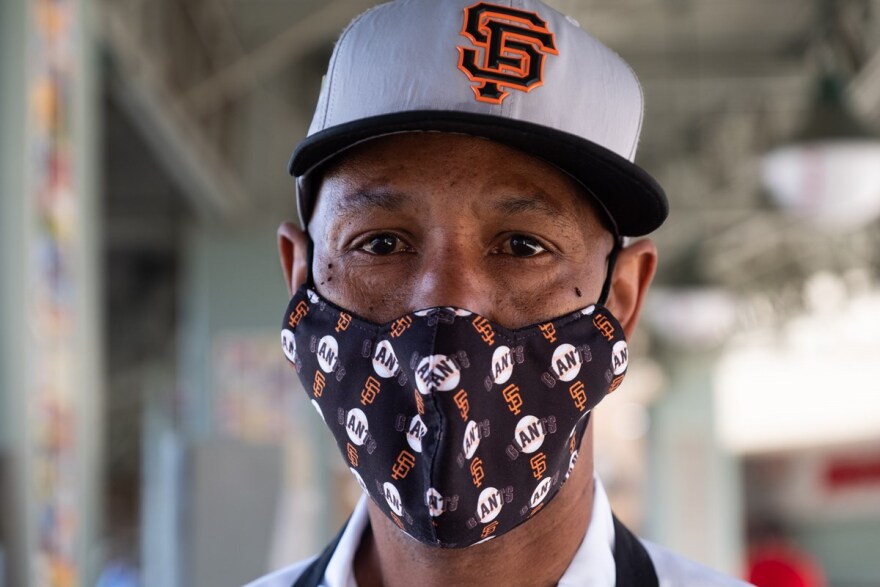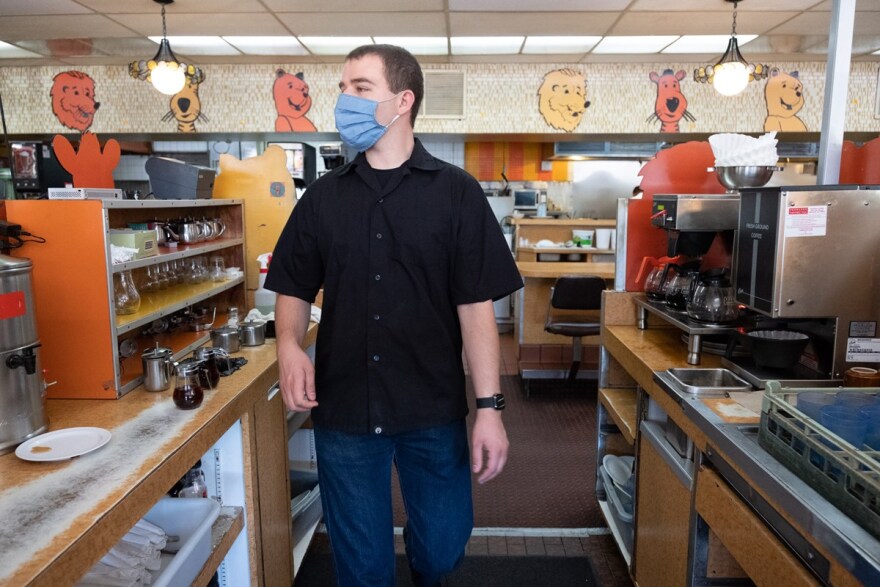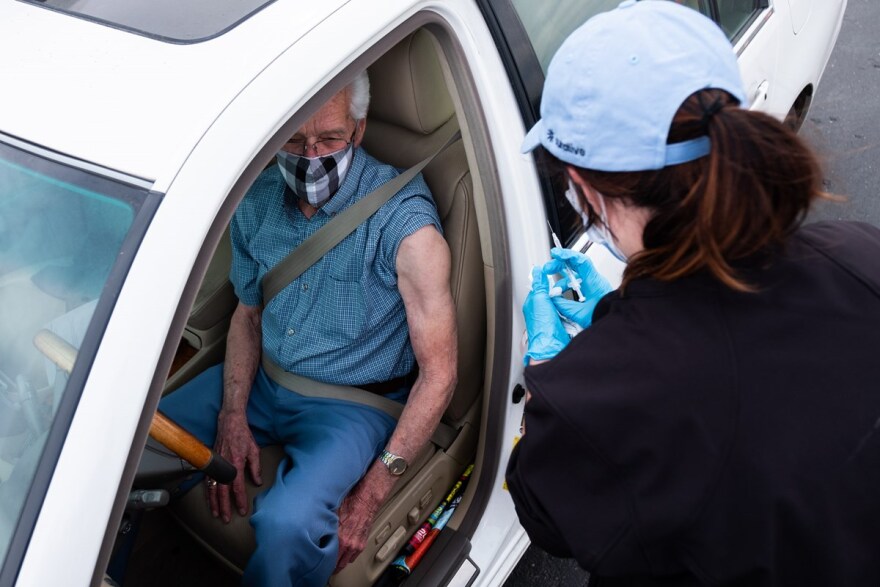For the first time in 450 days, California will no longer be under a stay-at-home order. The color-coded tier system will go away, allowing many businesses to reopen with few restrictions. The state's mask mandate will also expire.
But even with those major changes, COVID-19 is still present in the state. There will still be times you'll be asked to wear a mask, maintain social distance or limit capacity, especially if you're not currently vaccinated.
Here are answers to some major questions around California's reopen guidelines, and what experts recommend as we start moving into the next phase of the pandemic.
When should I wear a mask?

As with many things, it depends largely on whether you are vaccinated.
When it comes to the rules, as of June 15 California is mostly , meaning that vaccinated people aren't required to wear masks except in certain situations. Those are:
- On public transit
- Indoors in K-12 schools, childcare and other youth settings
- Healthcare settings, including long term care facilities
- Correctional facilities and detention centers
- Homeless shelters, emergency shelters and cooling centers
California health officials say the rules around schools could change if the CDC releases new guidance.
But local jurisdictions are still allowed to have stricter guidelines than the state, and individual businesses can choose to require masks for customers. And last week, California Health and Human Services Secretary Dr. Mark Ghaly said businesses could not prevent anyone from wearing a mask.
Unvaccinated people will still be required to wear a mask in indoor public settings and businesses.
.
What changes for customers at businesses?

While rules for customers at most businesses go away June 15, it depends both on your vaccination status and the rules set by the individual business.
To start, the tier system that California has had in place since last August is gone.
In most cases, there will be no more capacity or social distancing restrictions on businesses of all kinds. That means returning to full indoor dining at restaurants, no capacity restrictions at bars, gyms, movie theaters and other businesses.
But cities and counties can have stricter rules, and individual businesses can decide to keep their own rules in place around masks or distancing. And mask rules are different for those who are vaccinated and those who aren't.
In public businesses where fully vaccinated people no longer need to wear masks, employers and operators have a number of options. They can require all visitors to wear masks, provide information on masking, vaccination and COVID-19 spread while enabling visitors to self-attest to vaccination status or implement a vaccine verification system.
Gov. Gavin Newsom has discussed a but nothing has been implemented yet. Instead, California has said it will not implement its own vaccine passport system, and is leaving those decisions up to businesses.
These rules also aren't for employees at those businesses, who are covered by a different set of regulations. You can read more about that here.
What Changes For Workplaces?

One place that won't change on June 15 is the workplace for employees at businesses, though that’ll likely change just days later.
For now, Californians will still need to wear masks and socially distance in their workplaces. The California Occupational Safety and Health Standards board, also known as Cal/OSHA, has gone back and forth with its standards, since June 3.
Additionally, all workers still need to wear a face covering when working indoors or working outdoors when they are less than six feet from another person, and when required by the CDPH or their local health department, according to the .
This could change during the , which takes place June 17. If the board approves new rules allowing vaccinated Californians to forgo masks in the workplace this week, Gov. Gavin Newsom said Monday he plans to have those changes go into effect immediately.
What Changes For Events?

It depends on the size of the event you want to attend.
Going to a small local event? You'll need to follow the mask rules of the venue, but there will be no other restrictions.
But if you are attending what the state calls mega-events — those with 5,000 or more people indoors or 10,000 or more people outdoors — some restrictions are still in place.
The state is requiring attendees at indoor mega-events to have proof of vaccination or a negative COVID-19 test from the past 72 hours. While California is encouraging those at outdoor mega-events, they won't be required.
What Are The Rules For Traveling Now?
The state will be following CDC travel guidelines, meaning that anyone who is fully vaccinated can travel through the state or the country and aren't required to test or quarantine before or after travel unless they have COVID-19 symptoms.
For unvaccinated people, state health officials recommend you avoid non-essential travel outside of California and are strongly discouraging non-essential, unvaccinated travelers from other states or countries entering California.
If you do travel and are unvaccinated, you should get tested with a viral test 1-3 days before travel, and get tested 3-5 days after arriving. You should stay home and self-quarantine for seven days after traveling, even if your test is negative. If you don't get tested, you should stay home and self-quarantine for 10 days after travel.
Whether you are vaccinated or unvaccinated, they will have to wear a mask on public transportation such as planes, buses, trains, and in transportation hubs such as airports or train stations.
That means unless you're eating or drinking at the Sacramento International Airport you'll need a mask, according to airport spokesperson Scott Johnston.
"As far as the airport is concerned, unfortunately, nothing really changes for us on the 15th," Johnston said.
What Should I Do If Someone In My Family Can't Get Vaccinated?

If you’re indoors with only people who are fully immunized, the CDC says it’s OK to take your mask off and be less than six feet apart. But the rules get a little more complicated when you start to include friends or family members who are unvaccinated — especially those who are at risk for severe COVID-19.
Scientists are still exploring how common it is for immunized people to pass COVID-19 on to people who are not, but theindicates that people who are vaccinated and then develop the disease have low viral loads, which reduces the likelihood that they’ll transmit it to someone else.
“If you have a 10% chance of catching it and all of your vaccinated contacts also have that same 10% chance … we’re really not very concerned about that,” said Dr. Noha Aboelata, CEO of Roots Community Health Center in Oakland. “This may be different if you have an 80-year-old grandparent at home who’s chosen not to get the vaccine.”
Aboelata says if you live with someone who’s not vaccinated, you should continue masking and distancing in crowded settings where you don’t know everyone’s vaccination status. She says outdoor settings, or indoor environments with only fully immunized people, are the safest bets.
If you must be indoors with people who aren’t vaccinated, wear a mask and maintain a six-foot distance. This is especially important if someone in your family could get very sick if they catch COVID-19.
“I tell people to get vaccinated but also continue to wear a mask just for that added layer of protection,” said Dr. Alex McDonald with the California Academy of Family Physicians. “Just to be on the safe side, so you don’t accidentally bring it home.”
He says multigenerational families are at higher risk.
“One healthy person is going to work … even if grandma is staying home and doing everything right, it only takes that one time,” he said. “I don’t want to scare people, but I want to make sure we do everything we can to get out of this pandemic safely.”
recommend unvaccinated people wear masks and stay six feet from others when with people outside of their immediate household.
What Precautions Should Parents Of Children Who Can't Get Vaccinated Take?

The CDC recommends COVID-19 vaccination for everyone over the age of 12, though only the Pfizer vaccine is currently approved for people ages 12 to 18. Kaiser Permanente is currently running a vaccine trial for children between the ages of 5 and 11, and Pfizer-BioNTech has . But for parents of young children who remain unvaccinated, precautions are still in order.
If you are fully immunized, experts say you can be around other vaccinated people without a mask. Dr. McDonald with the California Academy of Family Physicians says that’s mostly still true if you have unvaccinated children at home. For example, he says a get-together with another family where the parents are vaccinated but the children aren’t is OK, especially if it’s outdoors.
“Nothing’s zero, but that sounds like a relatively low-risk situation,” he said. “Again, it’s an individual choice. It’s all about how much risk you’re willing to tolerate.”
Dr. Aboelata of Roots Community Health Center in east Oakland says fully immunized people who have an unvaccinated child at home should avoid high-risk settings.
“Being inside of any crowded, poorly ventilated indoor space with people whose vaccination status you don’t know — I would avoid that,” she said.
Unvaccinated children over the age of 2 should continue to wear masks in public settings and when around people they don’t live with. The says this is especially important when children are around adults who are at high risk for severe COVID-19.
The academy recommends that unvaccinated children wear masks:
- Indoors when the unvaccinated child will be with those from outside their household while maintaining physical distancing
- Outdoors when the unvaccinated individual is in large group settings while maintaining physical distancing
- During indoor and outdoor sports that require close contact ()
Unvaccinated children should wear masks at camp, at school, at day care, or anywhere they can’t stay a safe distance from others — such as the grocery store, according to
The academy says that everyone in a household, regardless of immunization status, should mask up in crowded situations, such as when taking public transit. And if there is a medically fragile child or an at-risk adult in the household, the academy says you “may want to consider having anyone at home who is not fully vaccinated wear masks at home to help protect them.”
What Is The Status Of The Spread Of The Coronavirus In California? Could There Be Another Surge?
As of June 14, 62,880 Californians have died from COVID-19 since the start of the pandemic, and the state has recorded more than 3.7 million positive tests.
While COVID-19 rates in California are the lowest they've been since the start of the pandemic, the virus is still present in the state. It's also more prevalent in some areas than others, especially in North State counties such as Modoc, Lassen and Shasta.
Health Secretary Dr. Mark Ghaly has said the state is expecting some increase in virus transmission after the economy reopens, but believes it won’t be widespread.
“It’s not that we won’t see COVID cases moving forward; it’s not that we won’t see even some isolated outbreaks,” Ghaly said last month. “But we do have the tools to manage that.”
State health officials have said vaccinations will be a big part of managing the spread of the virus. Currently around 56% of all Californians have received at least one dose of a COVID-19 vaccine, though that also varies greatly by county. In Lassen County, only 20% of residents have received at least one shot, compared to more than 75% in Marin County.
A major concern now are new variants, including the B.1.617.2 or Delta variant first described in India. Speaking with CapRadio Insight Host Vicki Gonzalez, Ghaly said that the existing vaccines in the United States have performed well against the Delta variant.
"We have seen some of the Delta variant, but like other variants, we are really happy at the moment that it seems to respond to the very strong vaccines that we have in California and in the United States," he said. "With low transmission and a number of Californians vaccinated and protected, we may not see in the near term significant spread and transmission, so those variants won't take hold.
What If Someone Close To Me Is Anxious About Reopening?

It’s perfectly normal to be feeling anxious as the state reopens. Here are some tips from mental health professionals on .
Go slow
It’s OK to decline invitations or to stick to smaller groups before diving into large gatherings or public places.
Think ahead
Make a list of scenarios that might make you uncomfortable and figure out how you might communicate your needs or exit the situation.
Try hybrid work (if you can)
If you’ve been working from home, consider easing into returning to the workplace and making time and space to get used to it again.
Check-in with kids
As kids and teens go back to school, they may be feeling nervous. Try to be there to reassure them this is a safe transition.
.
Do I Need To Get A Vaccine If I've Already Had COVID-19?

The CDC recommends that everyone who can get a COVID-19 vaccine, . The FDA also recommends that results from an antibody test "should not be used to evaluate a person’s level of immunity or protection from COVID-19 at any time."
While natural infection from COVID-19 does provide some protection, medical experts say it's unclear how much and for how long.
“Even though you’ve had COVID-19, it’s still very important for you to get the vaccine,”said Dr. Kristen Englund, an Infectious disease expert with the Cleveland Clinic. "We don’t know how long your immunity will last after you’ve had a natural COVID-19 infection.”
It's also unclear right now how many antibodies are produced after different kinds of infections, such as asymptomatic compared to symptomatic, according to Dr. Jennifer Pisano, an associate professor at the University of Chicago School of Medicine.
"With vaccination, we know that people with healthy immune systems are getting a great antibody response," . "So I would recommend vaccination even after a COVID-19 infection to get the best protection."
Copyright 2021 CapRadio


